
Health authorities in the UK are facing serious allegations of gaslighting local communities after dismissing widespread concerns about proposed drug consumption facilities as mere 'misinformation'. The controversial plans, which critics have labelled 'heroin shooting galleries', have sparked intense debate about the balance between public health initiatives and community safety.
Growing Backlash Against Official Statements
Community representatives and local activists have expressed outrage at what they perceive as dismissive attitudes from health officials. Many feel their genuine worries about the potential impact of drug consumption rooms on neighbourhood safety are being systematically undermined and invalidated.
One community leader stated: 'Instead of engaging with our legitimate concerns, officials are attempting to portray us as misinformed or ignorant. This isn't just frustrating - it's deeply disrespectful to people who have to live with the consequences of these decisions.'
The Controversial Proposal Explained
The proposed facilities, officially termed 'safe consumption rooms', would provide supervised spaces for drug users to consume illicit substances under medical supervision. Proponents argue such facilities:
- Reduce public drug use and discarded needles
- Prevent fatal overdoses through immediate medical response
- Connect users with addiction treatment services
- Decrease strain on emergency services
Community Concerns Versus Public Health Strategy
Opponents of the scheme, however, raise significant concerns about the potential normalization of hard drug use in residential areas. Many local residents worry that concentrating drug consumption in specific locations could:
- Increase anti-social behaviour in surrounding streets
- Create 'honeypot' areas attracting drug dealers
- Impact local businesses and property values
- Make families feel unsafe in their own neighbourhoods
The Communication Breakdown
The core of the controversy lies in the communication strategy employed by health officials. Rather than addressing community fears directly, critics allege that authorities have chosen to label opposition as misinformation - a tactic that has further alienated local stakeholders.
'This isn't just about policy differences,' explained a community organiser. 'It's about the fundamental right of residents to have their voices heard and their concerns taken seriously. Gaslighting entire communities is no way to build trust or find workable solutions.'
Looking Forward: A Path to Resolution
As the debate intensifies, calls are growing for more transparent consultation processes and evidence-based discussions that respect community intelligence while addressing complex public health challenges. The outcome of this confrontation could set important precedents for how future harm reduction initiatives are implemented across the UK.





